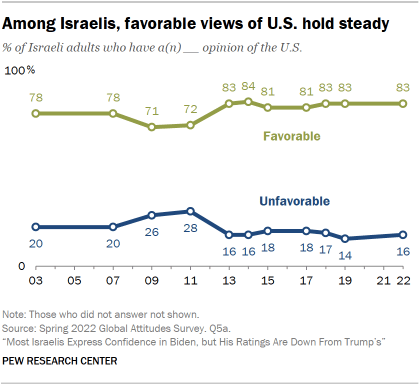
On the whole, Israelis voice more favorable than unfavorable views toward the U.S., despite significant political shifts in both countries since this question was last asked in 2019.1 About eight-in-ten Israelis express favorable views of the U.S., a figure that has remained generally steady since 2013. But even though these views remain quite positive overall, the share in Israel who have a very favorable opinion of the U.S. has dropped from 40% in 2019 to 31% in 2022.
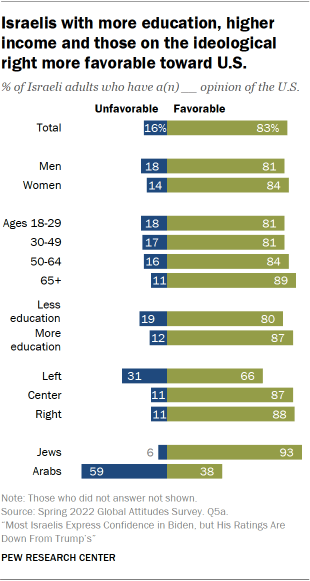
While there are no demographic differences on views of the U.S. when it comes to gender and age, opinions do vary somewhat across certain other groups in society. Israelis who have a postsecondary degree or higher levels of education are more likely to express a positive opinion of the U.S. than those with less education (87% vs. 80%, respectively).
As has historically been the case, people at different points along the ideological spectrum tend to feel differently about the U.S. Israelis who place themselves on the ideological right are 22 percentage points more likely to have a favorable view of the U.S. than those who place themselves on the ideological left (88% vs. 66%, respectively).
A particularly sharp divide is between Israeli Jews and Arabs. About nine-in-ten Jews (93%) have a favorable view of the U.S., compared with just 38% of Arabs. A similarly large difference exists between those who identify as Jewish (93% favorable toward the U.S.) and Muslims (34%). Jewish religious groups, however, vary little in their opinions: Around nine-in-ten or more Haredi/Dati, Masorti and Hiloni Jews all have positive views of the U.S.2
Israeli views of relations with the U.S. remain overwhelmingly positive, though down somewhat from 2019
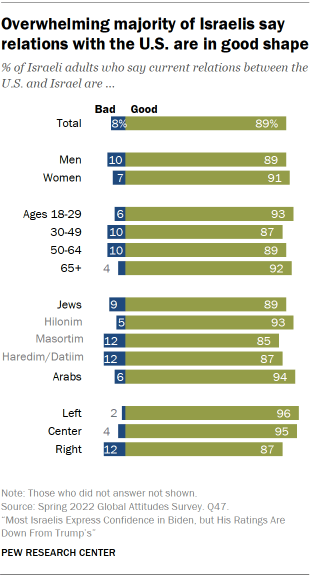
A very high share of Israelis (89%) say the current relationship between their country and the U.S. is good, which is more than the 74% of Americans who say the same. Still, this favorable assessment has declined in Israel since 2019, when 98% said the bilateral relationship was in good shape. The share describing relations as very good has also fallen substantially, from 63% in 2019 to 39% in 2022. Much of this decline comes from those on the ideological right and those in the ideological center, each of which were significantly more likely to describe relations in positive terms when Trump was in office than they are now. Those on the right (87%) are also less likely now than those on the left (96%) or in the center (95%) to say relations between the two countries are good.
Overwhelming majorities among both ethnic Jews (89%) and Arabs (94%) look favorably on the state of the U.S.-Israeli alliance. And among Jewish religious subgroups, no major differences of opinion emerge. (The survey sample is not large enough to allow researchers to analyze and report separately on subgroups of Israeli Arabs, such as Muslims and Christians.)
Israelis who have confidence in Biden are more likely to think relations are in good shape. Those who think he favors the Israelis too much and those that say he is striking the right balance are also more likely than those who think he favors the Palestinians to say bilateral relations are positive.
Fewer in Israel have confidence in Biden than in Trump
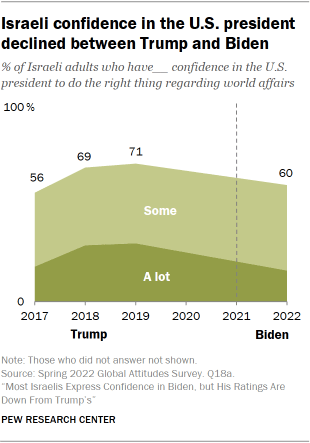
Relations between the Trump administration and the government of former Israeli Prime Minister Benjamin Netanyahu were quite warm, and the U.S. relocation of its embassy in Israel from Tel Aviv to Jerusalem was received particularly favorably in Israel. Since Biden has taken office, Israeli confidence in the U.S. president has fallen, with 60% saying they have confidence in Biden to do the right thing regarding world affairs, down from 71% who said the same of Trump in 2019. Also, fewer Israelis say they have a lot of confidence in Biden (16%) than felt that way about Trump (30%).
Confidence in Trump, however, grew throughout his presidency. When he took office, 56% had confidence in him – more than the 49% who had confidence in Obama at the end of Obama’s presidency, but roughly on par with the 60% who now say they have confidence in Biden.
Jewish Israelis are nearly twice as likely as Arab Israelis to say they have confidence in Biden (65% vs. 34% respectively). But among Jewish religious subgroups, opinion varies markedly: About eight-in-ten Hilonim have confidence in Biden, compared with 58% of Masortim and half of Haredim/Datiim (self-identified ultra-Orthodox and Orthodox, combined).
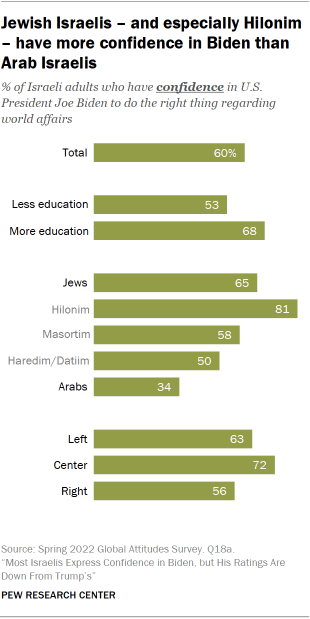
Those who place themselves in the ideological center are more likely to have confidence in Biden than those who place themselves on the left or right. About three-quarters (74%) of those who politically identified with one of the parties in the Bennett-Lapid governing coalition have confidence in Biden, compared with half (51%) of those who did not support the governing coalition at the time of the survey (March-May 2022).
Opinion on several of Biden’s policies toward Israel is also related to confidence in the U.S. leader. Roughly three-quarters (78%) of Israelis who say Biden is striking the right balance in the region have confidence in the president, compared with 55% of those who say Biden is favoring the Israelis too much and 40% of those who say he is favoring the Palestinians too much. In addition, those who approve of the Biden administration’s plan to reopen a consulate in East Jerusalem are 22 percentage points more confident in the U.S. president than those who do not approve of this action (71% vs. 49% respectively).
Many in Israel do not see Biden’s personality as favorably as Trump’s
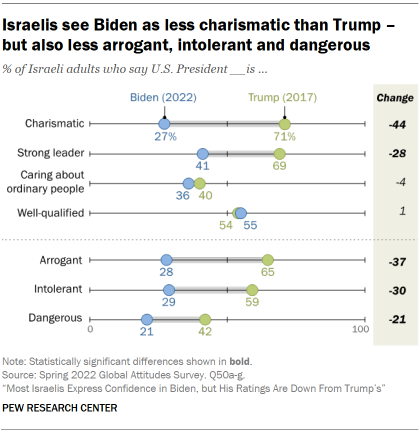
In 2017, when Israelis were asked about Trump’s attributes, they stood out globally for the degree to which they praised Trump’s leadership abilities and charisma. In 2022, Biden does not come close to Trump on these dimensions: Only 27% of Israelis consider Biden to be charismatic and fewer than half (41%) describe him as a strong leader. Still, the Israeli public considers him comparably well-qualified (55%), and about as many describe him as caring about ordinary people as said the same of Trump – though only around a third hold this view.
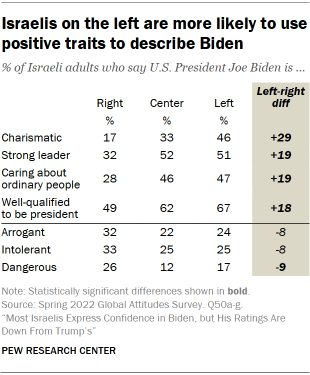
Although Israelis were more likely to praise various positive aspects of Trump’s personality, they are also less likely to find fault with Biden on several negative traits. They are significantly less likely to describe Biden as arrogant (-37 percentage points), intolerant (-30) or dangerous (-21).
Israelis on the left of the ideological spectrum are more likely than those on the right to say Biden exhibits each of the positive personality traits tested in the survey. For example, those on the left are more than twice as likely as those on the right to say Biden is charismatic (46% vs. 17% respectively).
Israelis are divided over whether Biden is striking the right balance between Israelis and Palestinians
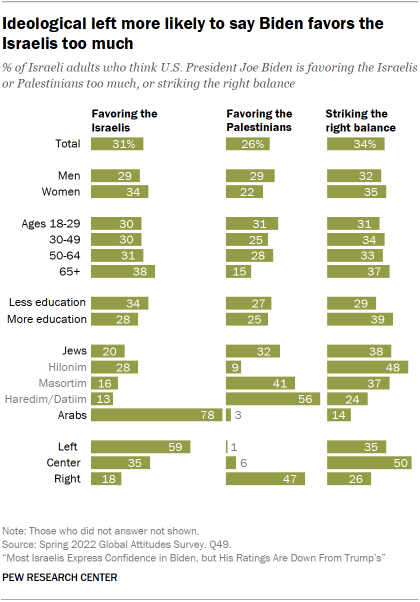
Biden took office looking to reset the tenor of the U.S.-Israel relationship, which his administration believed had skewed toward Israel during Trump’s presidency. When examining Israelis as a whole, there is no clear sense that the U.S. skews one way or another. Rather, Israelis are very divided about whether Biden is favoring the Israelis too much (31%), favoring the Palestinians too much (26%) or striking about the right balance (34%).
But differences across ethnicities and religious groups are substantial. For example, Arab Israelis are much more likely than Jewish Israelis to think Biden favors the Israelis too much. Jewish Israelis are divided on the issue: 38% of Jews think Biden is hitting the mark, compared with 32% who think he’s favoring the Palestinians and 20% who think he’s favoring the Israelis. But, once again, Jewish religious groups vary greatly: A plurality of Hilonim think Biden is striking the right balance, a majority of the Haredim/Datiim think he’s favoring the Palestinians and the Masortim fall in the middle, somewhat divided between the two positions.
Views of Biden’s handling of the Israel relationship were also related to domestic political attitudes. Around half (46%) of those who supported one of the parties in the Bennett-Lapid governing coalition thought Biden was striking the right balance, and few (5%) believed he was favoring the Palestinians too much; most others (40%) saw preferential treatment for the Israelis. But among those who did not support the ruling coalition, opinion was more mixed: 38% saw Biden favoring the Palestinians, 27% the Israelis and 26% striking the right balance.
Opinion is also divided ideologically: A majority of those on the left think Biden favors the Israelis too much, nearly half of those on the right thinks he’s favoring the Palestinians too much and those in the center are much more likely to say he’s striking the right balance.
Israeli sentiment about whether Biden’s policies are evenhanded are also related to opinion about one of Biden’s campaign promises: to reopen the U.S. Consulate in East Jerusalem, which has historically dealt primarily with Palestinian citizens. Overall, this move – which the Bennett government opposed – is also broadly unpopular with Israelis: 55% disapprove of the measure, compared with 26% who approve. A plurality (42%) of those who disapprove of the measure think Biden is favoring the Palestinians too much, whereas half of those who support the reopening of the consulate think he’s striking the right balance.
More Israelis disapproved than approved of Bennett’s policies toward the U.S.
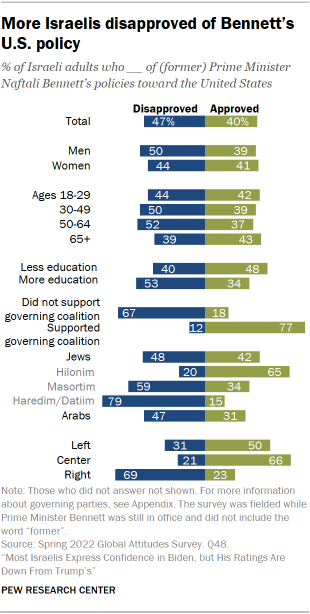
Former Israeli Prime Minister Naftali Bennett took office in June 2021, saying he wanted to bring “a new spirit of cooperation” to the U.S.-Israel relationship, following on the heels of Benjamin Netanyahu’s polarizing legacy in the U.S. Now, his coalition partner, Yair Lapid, is in charge of the Israeli side of the relationship as Israel’s caretaker prime minister, pending an election in the fall. Lapid also may inherit some public skepticism, as more Israelis disapproved (47%) than approved (40%) of Bennett’s policies toward the U.S. at the time of the survey.
Jewish Israelis were slightly more likely than Arab Israelis to approve of Bennett’s handling of the relationship (42% vs. 31%). But there were also deep divisions within Israel’s Jewish population: 65% of self-identified Hilonim applauded his U.S. policy, compared with 34% of Masortim and just 15% of the combined Haredi/Dati community.
Political divides were also stark: 77% of those who supported Bennett’s governing coalition said they approved of his policies, compared with 18% of those who did not support the parties then in power. Those who placed themselves in the center of Israel’s ideological spectrum were also more likely to approve of his policies than those who placed themselves on the left or the right. And Israelis with at least a postsecondary education were more likely to approve of his policies than those with less formal schooling.3
When it comes to views of Bennett’s U.S. policy, confidence in the U.S. president also played a role. Those who said they had a great deal or some confidence in Biden to do what is right regarding world affairs were more than twice as likely to approve of Bennett’s handling of the relationship as those who had little or no confidence in Biden (52% vs. 23% respectively).
Israelis see boycotts as a threat to their country – but less so than many other issues
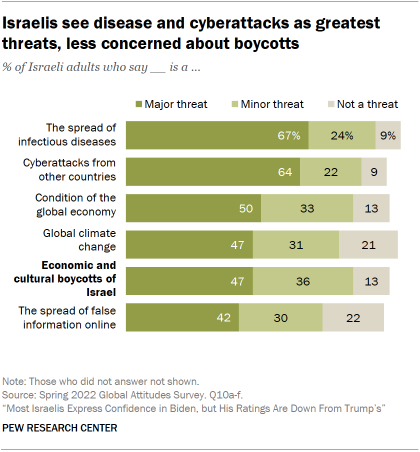
Around half of Israelis think that economic and cultural boycotts of Israel are a major threat to the country – and an additional 36% consider such boycotts to be a minor threat. Those figures are comparable to the shares who say that global climate change, as well as the condition of the global economy, are threats to Israel. But many more Israelis consider the spread of infectious diseases to be a major threat, and the same is true of cyberattacks from other countries.
Arab and Jewish Israelis don’t differ very much in their assessments of how threatening boycotts are for Israel. But Jewish subgroups differ substantially: 57% of Hiloni Jews consider economic and cultural boycotts of Israel to be a major threat, compared with 44% of Masorti Jews and only 35% of Haredim/Datiim. Haredi and Dati Jews (28%) are also more than three times as likely as the other groups to describe the boycotts as not a threat at all. Israelis with higher levels of education and those on the ideological left are also more likely than those with lower levels of education or those in the center or on the right, respectively, to perceive the boycott movements as major threats.




